News

Dark truth about Sri Lanka's ethanol ban revealed!
The ban on ethanol imports and the move of creating a state monopoly in local ethanol supply was aimed at flushing out existing liquor manufacturers from the arena and promoting new comers with the backing of ruling party bigwigs, industry sources claimed.
Further the delay in the clearance of ethanol tankers imported by local manufacturers placing orders and opening LC’s before the government’s ban on rectified spirit has crippled the local liquor manufactures.
While the Sri Lanka Customs claims the importation of ethanol has been temporarily banned, it has been revealed that a gazette notification in this regard has not been issued yet and the ban is being implemented on a letter sent by the Ministry of Finance on January 2 official documents revealed. 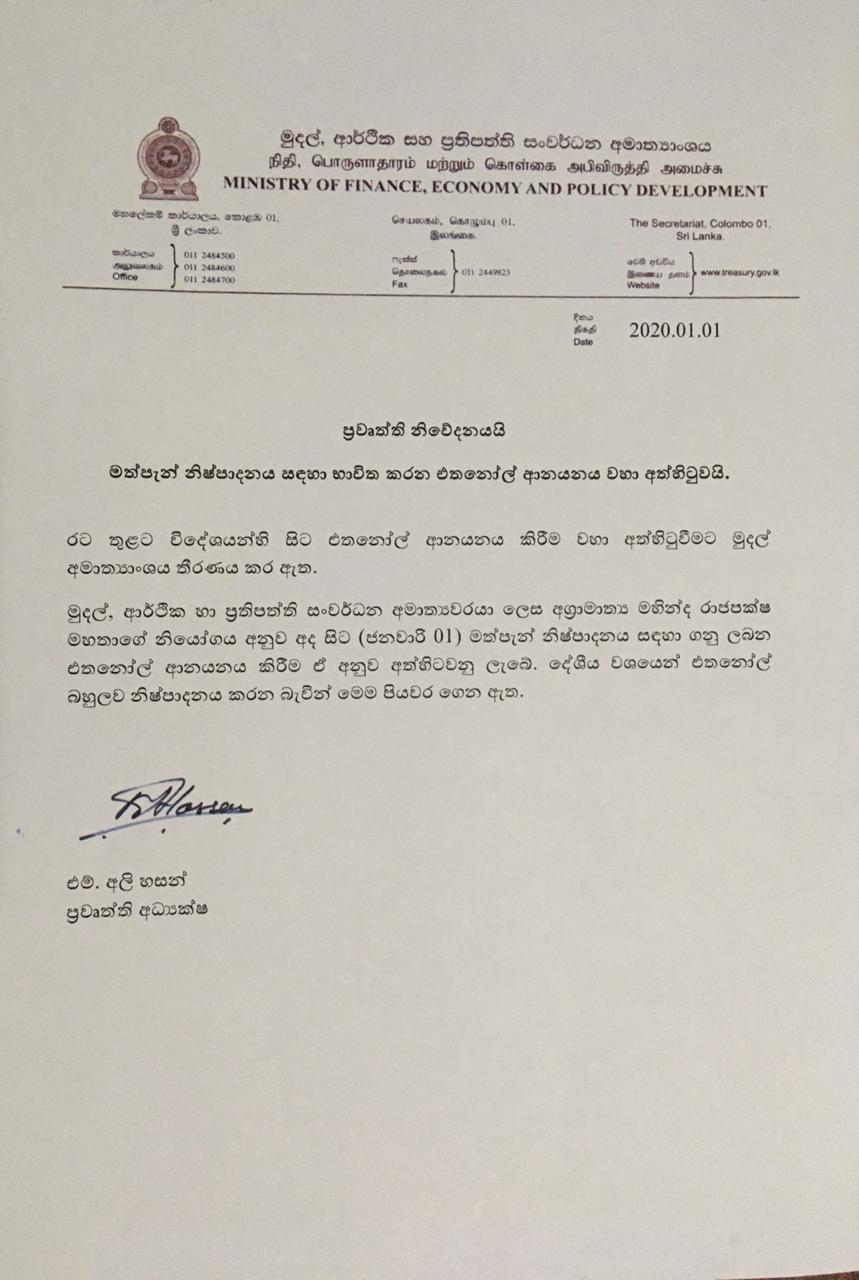
In a letter, Commissioner General of Excise A. Bodaragama has directed the manufacturers to purchase ethanol either from Pelwatte Sugar Distilleries (Pvt.) Ltd. or Lanka Sugar Company Ltd. – Sevanagala, two state-owned ethanol distilleries.
This move by the Department of Excise has bewildered the manufacturers as the restriction was neither officially announced nor pre-communicated, and is also being particularly targeted at them.
Earlier, alcohol manufacturers have been allowed to purchase from any local ethanol distillery, and If the Government sticks to the original ban, the liquor industry would cut their production, which would result in a significant loss of revenue to the Government, manufacturers added.
Manufacturers were purchasing ethanol from Royal Casks Distilleries (Pvt.) Ltd., the only distillery that produces ethanol using maize as raw material with international quality.
The Department of Excise has turned down a request from a leading manufacturer to purchase over 347,000 litres of ethanol from Royal Casks, they said.
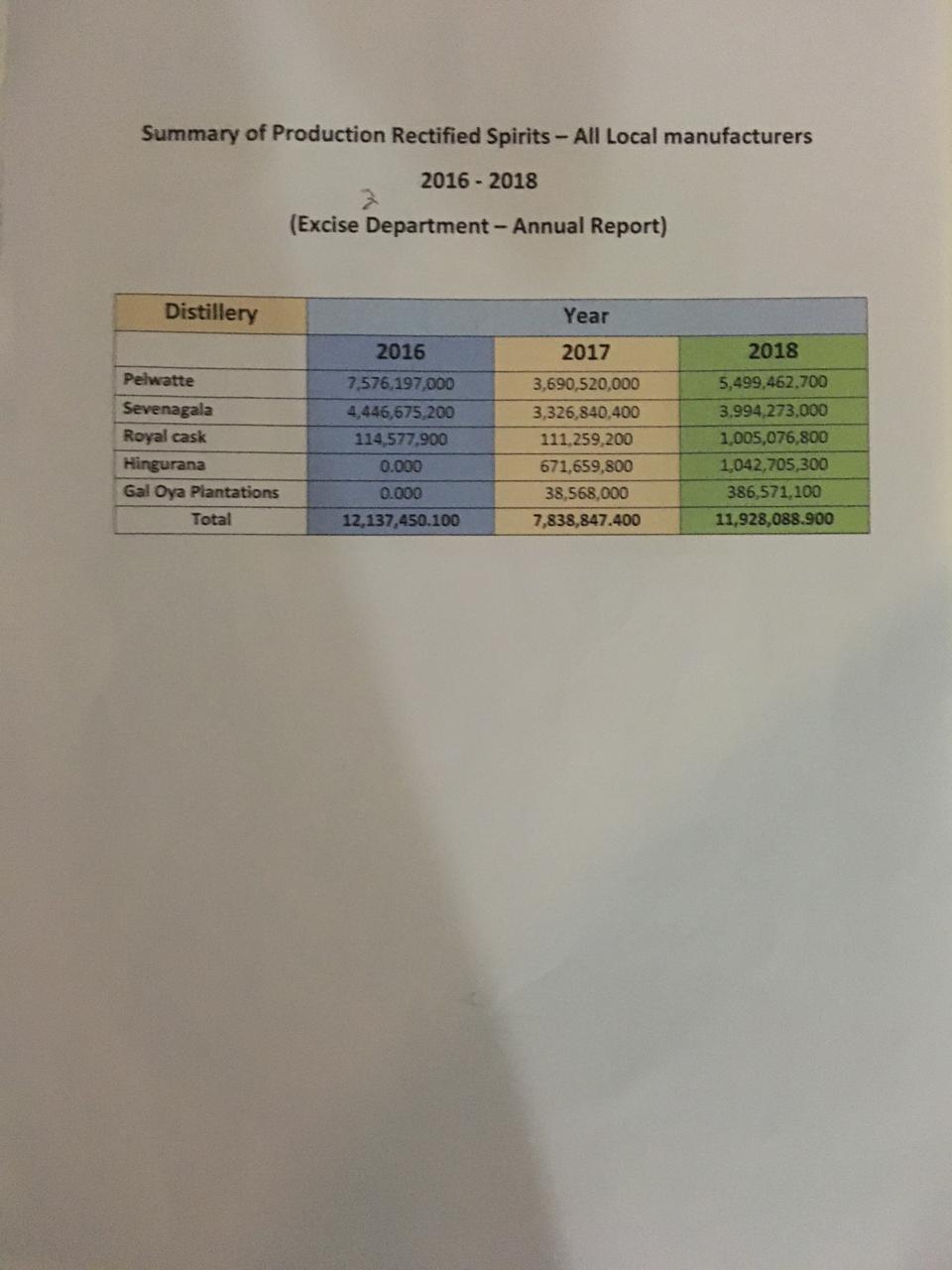
Galoya Plantation (Pvt) Ltd. is reported to have been stock piling ethanol with a plan of opening a liquor bottling plant to enter into liquor production in a big way, informed sources said.
This company is managed as a Public-Private Partnership (PPP) between the Government and a consortium led by Brown & Company PLC and LOLC PLC.
According to the Ministry of Finance, the excise revenue target was Rs. 130 billion, out of which Rs. 68 billion was expected from the taxation of ethanol imports. During the financial year 2018/2019, Distilleries Company of Sri Lanka (DCSL) paid Rs. 58 billion in taxes, and Rs. 64 billion in taxes a year ago.
At least 22 licensed importers have been affected by the ban on ethanol imports and a very few of their containers (1 or 2) including 41 tankers imported by Distilleries Company of Sri Lanka (DCSL) are still to be cleared by Customs due to strict procedure of the department, several importers said.
They pointed out that the directive of the President to allow clearance of the quantity of ethanol shipments arranged before the ban will fulfill the local requirement temporarily but a shortage of ethanol based products and the loss of tax revenue will be resulted in the long run.
However, with the absence of competition due to ban on ethanol imports, the ethanol produced in Sri Lanka is alleged to be of lower quality, according to several alcohol manufacturers in the country.
They noted that using local ethanol in their production process could affect the taste and result in the increase of harmful chemicals in their end product.
“Therefore the restriction on the import of ethanol needs to be restored at an early date, as otherwise the production of illegal liquor in the illicit market would flourish, resulting in harmful health effects on consumers, ”they added.
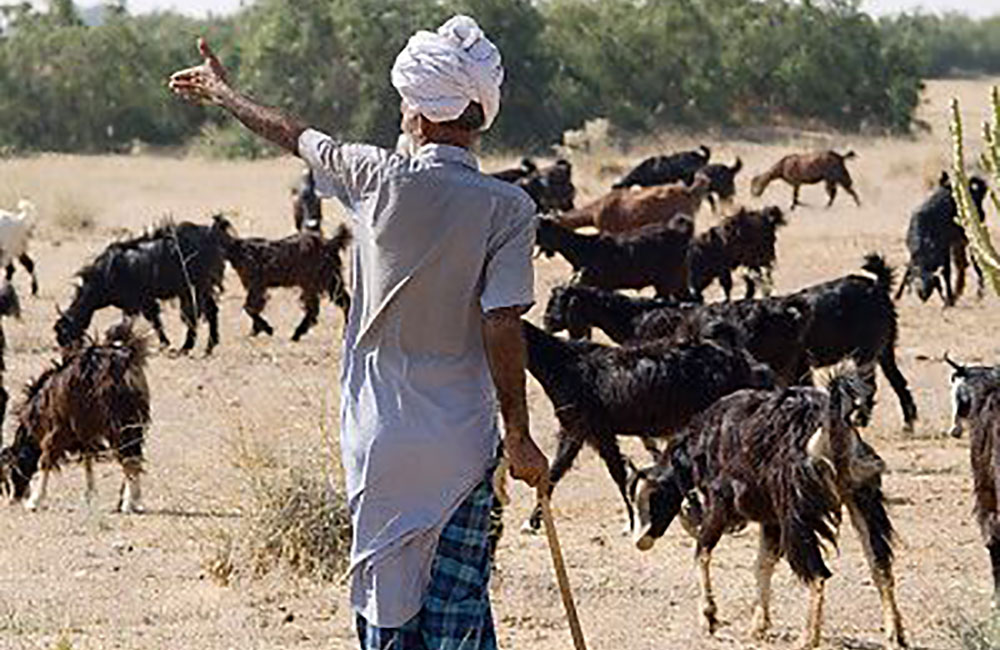
Goats gone missing after soldiers allegedly torture young Tamil herdsman
The bruised young man has later been admitted to hospital.
According to the complaint lodged by relatives at the Thunukkai police station, 20 years old Rasaratnam Dhanushan has been beaten up on 30 June morning by soldiers at Eruvil when he was taking his goats for grazing at a woodland.
The young man had been prevented from calling his family by the soldiers who allegedly seized his mobile phone and handed him over to forest conservation officers around 7pm.
Forest officers in Mankulam have admitted Dhanushan to the Mulankavil rural hospital after alerting his relatives. He had been transferred to the Kilinochchi general hospital the next day for further treatment.
Relatives of the tortured victim have told police that a few of the goats have also gone missing.
The Sri Lanka Army has not made any statement so far.
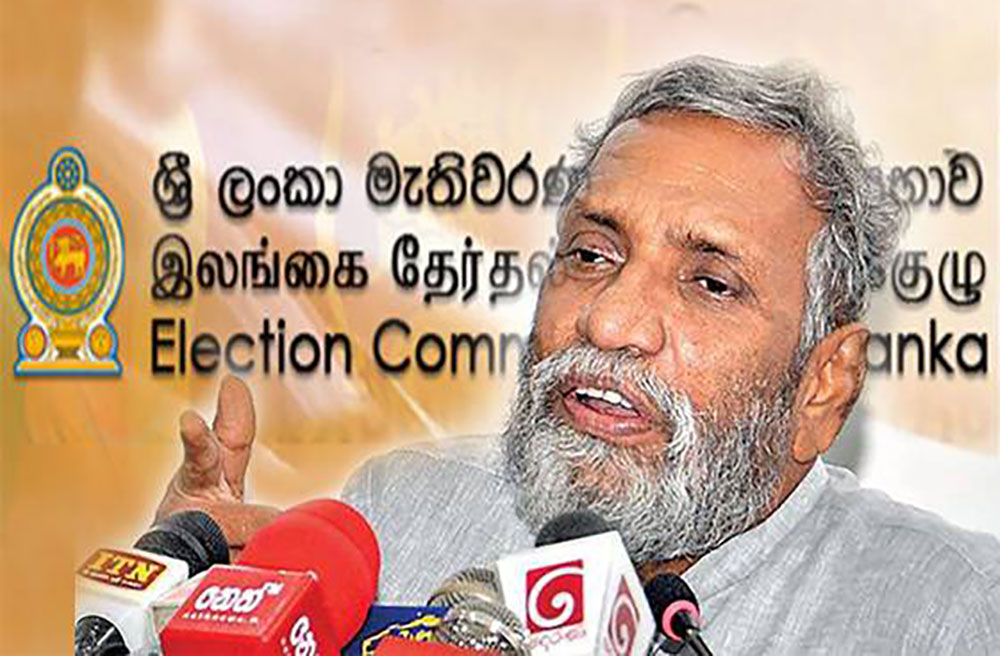
Mahinda Deshapriya concerned over delay in enforcing COVID-19 health guidelines for polls
Mahinda Deshapriya, Chairman of the National Election Commission, said that the health guidelines for conducting the elections were announced on June 2 but they have not been legalised through a gazette notification.
The guidelines have been sent by the health authorities to the Attorney General''s Department, which would give a nod for them to be gazetted.
“What we see now is candidates and their supporters campaigning shoulder to shoulder, they do not keep the required one metre distancing, they do not even wear face masks,” Deshapriya said.
The health guidelines require wearing face masks, frequent hand washing and maintaining one-metre distance. The number of people at poll campaign gatherings has also been reduced to a bare minimum.
The parliamentary elections in the country are scheduled for August 5 and the campaigning has been at a very low scale due to the COVID-19 pandemic compared to previous elections.
President Gotabaya Rajapaksa on March 2 dissolved the Parliament, six months ahead of schedule, and called for snap polls on April 25. However, the election commission in mid-April postponed the elections by nearly two months to June 20 due to the coronavirus outbreak in the island nation.
The commission last month informed the apex court that the polls cannot be held on June 20 because of the coronavirus pandemic and the new date was decided following a unanimous decision reached between the members of the commission.
The election commission held several mock polls to put into practice health guidelines and on Monday extended the poll time by one hour in view of the pandemic.
There are over 16 million eligible voters in the country. The August 5 poll will elect a 225-member Parliament for a five-year term.
Deshapriya''s comments came as Sri Lanka recorded its highest spike for a single day on Friday. As many as 300 cases were reported from a rehabilitation centre for drug addicts from the north central region of the country.
Sri Lanka has reported 2,454 COVID-19 cases with 11 deaths.
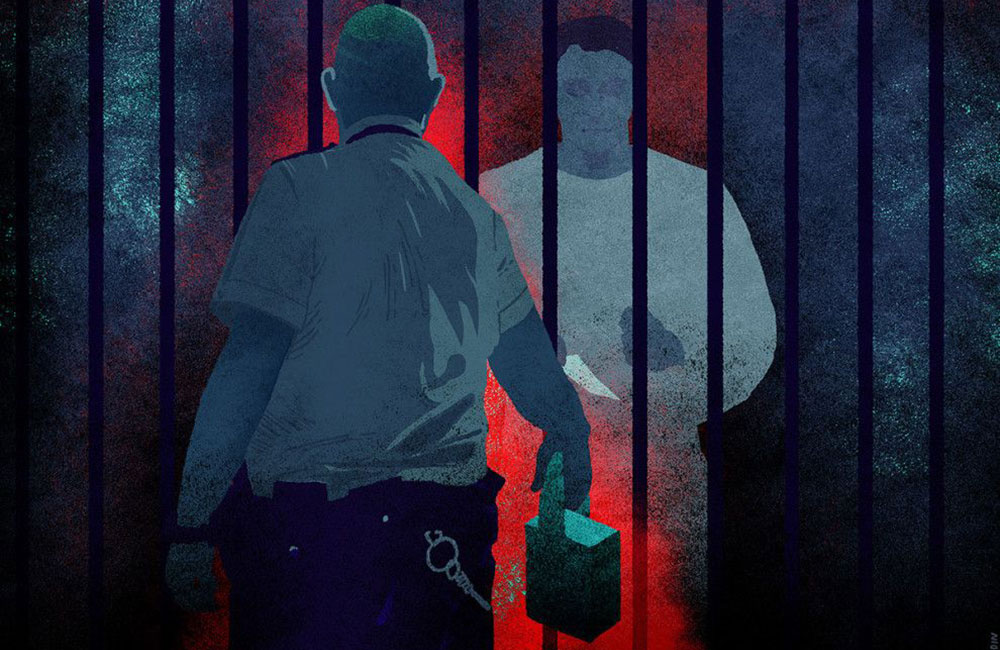
CID investigates multiple bank accounts of former prison head
The Police said that the officer concerned is currently under suspension. They added that the investigations have revealed how the officer had been depositing large sums of money daily into his bank accounts.
Investigations have also revealed that the money had been deposited by an assistant of the officer concerned.
The CID has obtained statements from around 40 persons including officers from the Department of Prisons.

Instigated by China, Sri Lanka could end port deal with India?
Sri Lankan President Gotabaya Rajapaksa recently announced that Colombo will review the port agreement signed between India and Sri Lanka at an estimated cost between $500 to $700 million.
Experts see this move as an effort to distance itself with ‘QUAD’ nations, especially India, which is trying to counter China’s growing geopolitical influence. The “QUAD” nations include the U.S., India, Japan and Australia who currently have turbulent ties with China.
“We heard that there is a lot of pressure from India over this project. But we are not a province of India, we are a sovereign nation and we do not need to dance to their tunes,” said Shyamal Sumanarathna, secretary of the Ports, Commerce Industries and Progressive Workers Union. “Following our strike, the prime minister assured [us] that he will sort this issue out,” he added.
The previous government of Sri Lanka signed a Memorandum of Understanding (MoU) with India and Japan to develop the new East Container Terminal (ECT). According to the terms, Sri Lanka holds 51% stake while India and Japan share the remaining stake.
However, the Trade Unions fear that it will cede the ownership of the ECT to India. They are demanding a guarantee that the project will be fully owned by the Sri Lanka Ports Authority, a government entity. Prime Minister Mahinda Rajapaksa has assured them that there is “no final agreement” yet.
“About two-thirds of Sri Lanka’s international cargo traffic is with India. There are opportunities for win-win cooperation among India, Sri Lanka and Japan in developing the ECT to promote prosperity in our maritime region,” stated a representative of the Indian High Commission in Colombo.
Rajapaksa has formed a five-member committee to review and report on the concerns over the project in 45 days and also to recommend steps ensuring the terminal delivers the maximum benefit for Sri Lanka.
Amid India’s growing tensions with China, Pakistan and Nepal, there are signs that ties with Sri Lanka could also turn sour as Beijing could instigate the island country to terminate a port deal with New Delhi.
Sri Lankan President Gotabaya Rajapaksa recently announced that Colombo will review the port agreement signed between India and Sri Lanka at an estimated cost between $500 to $700 million.
Experts see this move as an effort to distance itself with ‘QUAD’ nations, especially India, which is trying to counter China’s growing geopolitical influence. The “QUAD” nations include the U.S., India, Japan and Australia who currently have turbulent ties with China.
“We heard that there is a lot of pressure from India over this project. But we are not a province of India, we are a sovereign nation and we do not need to dance to their tunes,” said Shyamal Sumanarathna, secretary of the Ports, Commerce Industries and Progressive Workers Union. “Following our strike, the prime minister assured [us] that he will sort this issue out,” he added.
The previous government of Sri Lanka signed a Memorandum of Understanding (MoU) with India and Japan to develop the new East Container Terminal (ECT). According to the terms, Sri Lanka holds 51% stake while India and Japan share the remaining stake.
However, the Trade Unions fear that it will cede the ownership of the ECT to India. They are demanding a guarantee that the project will be fully owned by the Sri Lanka Ports Authority, a government entity. Prime Minister Mahinda Rajapaksa has assured them that there is “no final agreement” yet.
“About two-thirds of Sri Lanka’s international cargo traffic is with India. There are opportunities for win-win cooperation among India, Sri Lanka and Japan in developing the ECT to promote prosperity in our maritime region,” stated a representative of the Indian High Commission in Colombo.
Rajapaksa has formed a five-member committee to review and report on the concerns over the project in 45 days and also to recommend steps ensuring the terminal delivers the maximum benefit for Sri Lanka.
However, it is important to note that Sri Lanka has turned to China several times for bailouts when the country went down on lockdown for two months amid the Covid-19 pandemic.
As reported earlier by EurAsian Times, Sri Lanka had relied heavily on China to construct $1.5 billion port in Hambantota in the country’s south. After the port was operating at a loss and couldn’t generate enough revenue to repay the loan to Beijing, the port was leased to China for 99 years in return for $1.1 billion which eased its position.
Beijing further granted $500 million to Colombo to fight the pandemic to help the looming financial crisis.
Sri Lanka has also requested various foreign governments including India for a postponement of repayment of the debt as the island nation is reeling under major economic crisis. “The matter has progressed and technical level discussions are presently underway,” Spokesperson in the Ministry of External Affairs Anurag Srivastava said.
Rohan Masakorala, a maritime shipping expert and CEO of the Shippers Academy Colombo disputed the trade union’s claim calling them “nationalistic” and politically motivated with views, not in line with the global business strategies.
“South Asia Gateway Terminal has been running for over 20 years with a number of international partners, and similarly the Colombo International Container Terminal has been operating for seven years with a Chinese company,” he said.
Sri Lanka’s government has also recently halted the Japan-funded Colombo Light Railway project and a $480 million Millennium Challenge Corporation grant from the U.S. Harin Fernando, a Member of the Parliament of Sri Lanka, accused the current administration of turning Sri Lanka into a “banana republic” under Chinese rule.
“In 2014, before we toppled the government, this is what we highlighted. But now we see [the Chinese] doing this much more strategically,” he said. He is also of the view that China now has a complete monopoly on Sri Lanka’s development projects and that Sri Lanka is “under debt” of China.
(Eurasian Times)
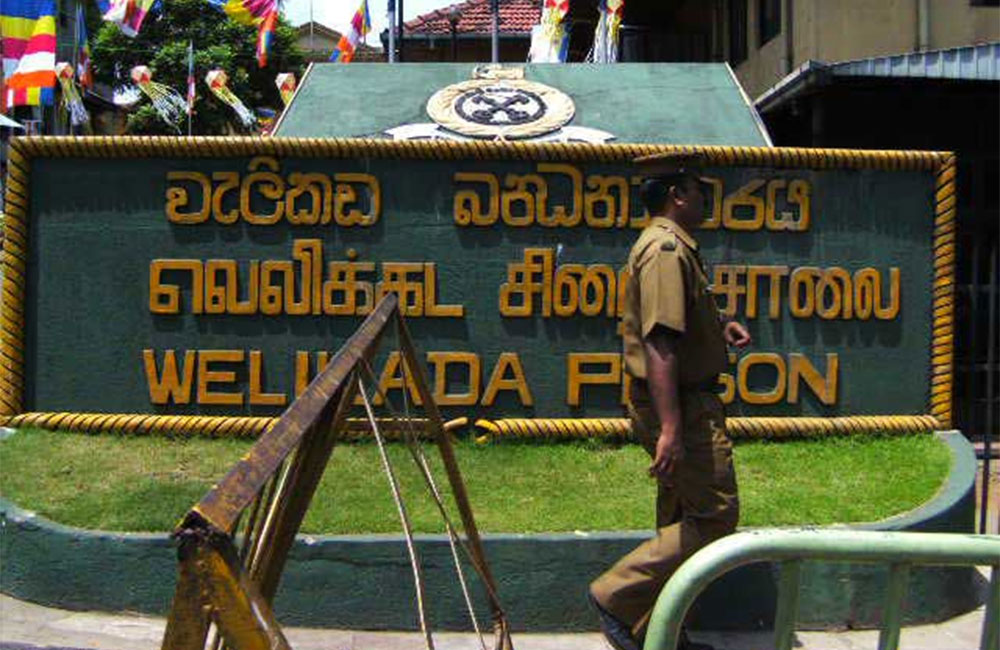
Welikada prison inmate contracts Coronavirus
The inmate had been transferred to the Welikada Remand Prison on June 27 from the Rehabilitation Center for drug addicts in Kandakadu.
The Director General of the Government Information Department, Nalaka Kaluwewa, said that PCR tests are being carried out on all contacts of the Covid-19 patient including inmates and prison officials.
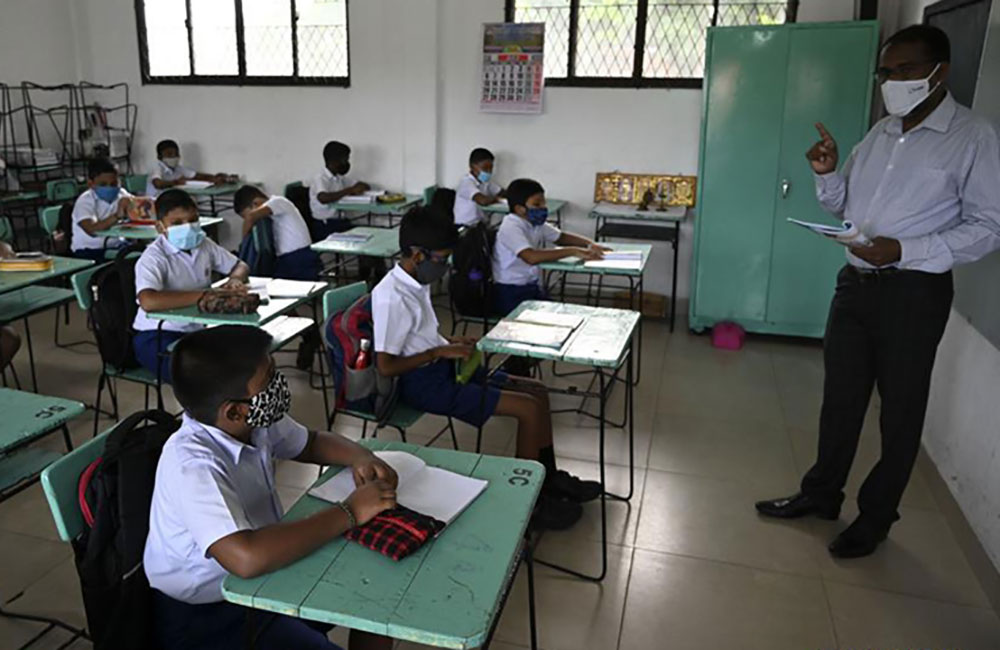
Schools partially re-open under strict health guidelines
According to the Education Ministry, schools re-opened on Monday for grades 13, 11 and 5, leading to nearly 800,000 students returning back to school across the country, reports Xinhua news agency.
Strict health guidelines were followed as students were subjected to temperature checks, frequent washing of hands and wearing face masks.
Chairs and desks were kept one metre apart in each class room and students were informed to speak to each other from a distance.
The Education Ministry said that under the third phase, schools would re-open for grades 10 and 12 students on July 20, and under the fourth stage from July 27, schools would re-open for the rest except for grades 1 and 2.
All sports activities and tests however have been cancelled until further notice, the Ministry said.
Sri Lanka has so far reported 2,078 positive COVID-19 patients but has seen an over 90 per cent recovery rate with 1,917 patients out of the total detected been successfully treated and discharged.
Active patients are now down to 161, official statistics from the Health Ministry showed.
The deaths stood at 11.
Capital Colombo resumed economic operations at the end of May after being shut for nearly two months to prevent a further spread of the virus, and since then the country has seen the gradual re-opening of several sectors.
–IANS
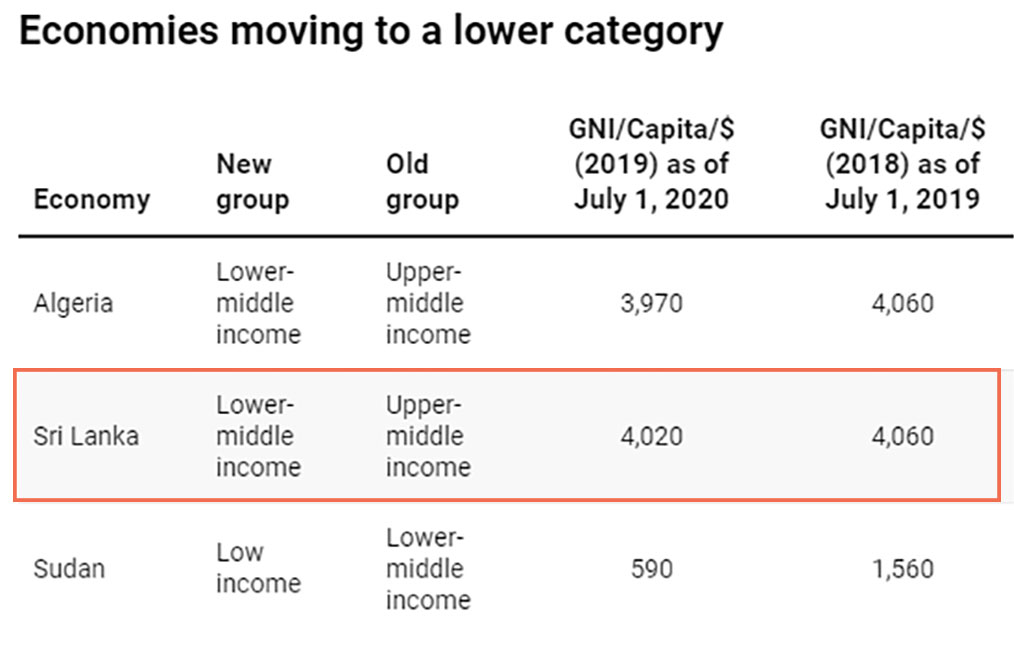
World Bank downgrades SL to lower-middle income country
The move comes under the World Bank’s 2020-2021 country classification by income level, exactly a year after Sri Lanka was classified as an upper-middle income category.
The world’s economies are assigned into four income groups—low, lower-middle, upper-middle, and high-income countries by the World Bank.
The classifications are updated each year on 1 July and are based on GNI per capita in current US Dollar (using the Atlas method exchange rates) of the previous year.
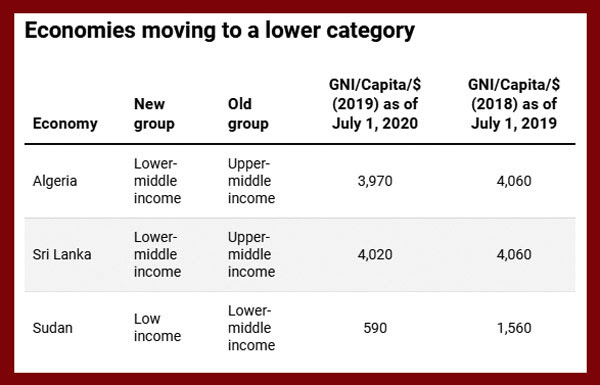
The World Bank said Sri Lanka was downgraded as a lower-middle income country after it recorded $ 4,020 per capita income for 2020, in comparison to the $4,060 last year, which resulted in the country being classified in the upper-middle income category in 2019.
For the current 2021 fiscal year, low-income economies are defined as those with a GNI per capita, calculated using the World Bank Atlas method, of $ 1,035 or less in 2019; lower middle-income economies are those with a GNI per capita between $ 1,036 and $ 4,045; upper middle-income economies are those with a GNI per capita between $ 4,046 and $ 12,535; high-income economies are those with a GNI per capita of $ 12,536 or more.
The World Bank also noted that the GNI numbers that were used for this year’s classification did not yet reflect the impact of the COVID-19 pandemic.
(Daily FT)
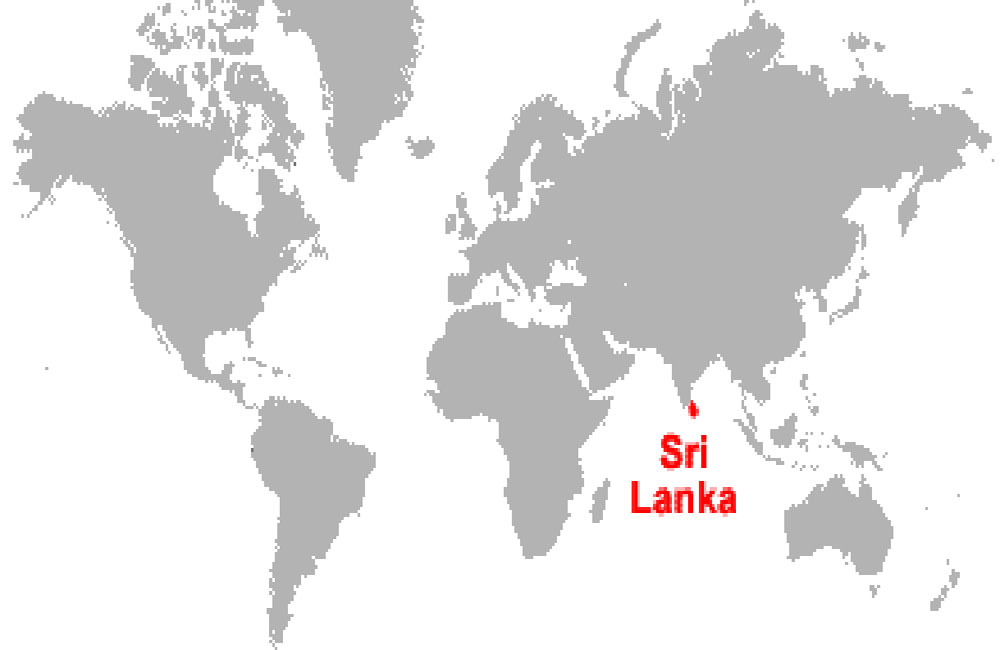
Sri Lanka among countries listed as 'unsafe to travel'
The British Foreign and Commonwealth Office (FCO) updated its global advisory yesterday (Saturday) against ‘all but essential’ travel, exempting destinations that no longer pose an unacceptably high risk for British travellers.
The countries exempted from the travel advisory included cities in Europe, Americas, Asia Pacific, Africa and Antarctica.
“These exemptions came into effect on 4 July. All our advice will remain under constant review to take into account the latest situation in each country. These countries have been assessed as no longer presenting an unacceptably high risk to British people travelling abroad. Foreign & Commonwealth Office (FCO) travel advice is based on risks to British nationals, including in-country public health assessments,” the FCO said.
Australia, South Korea, Malaysia, New Zealand, Singapore, France, Greece, Italy and Germany are among the countries seen as safe for Brits to travel to.
On Friday, the United Kingdom announced that tourists from over 50 countries and territories will be able to visit the UK from July 10, without facing a mandatory 14-day quarantine period upon arrival.
The list, however, did not include Sri Lanka which has announced that the coronavirus is under control and not spreading among communities.
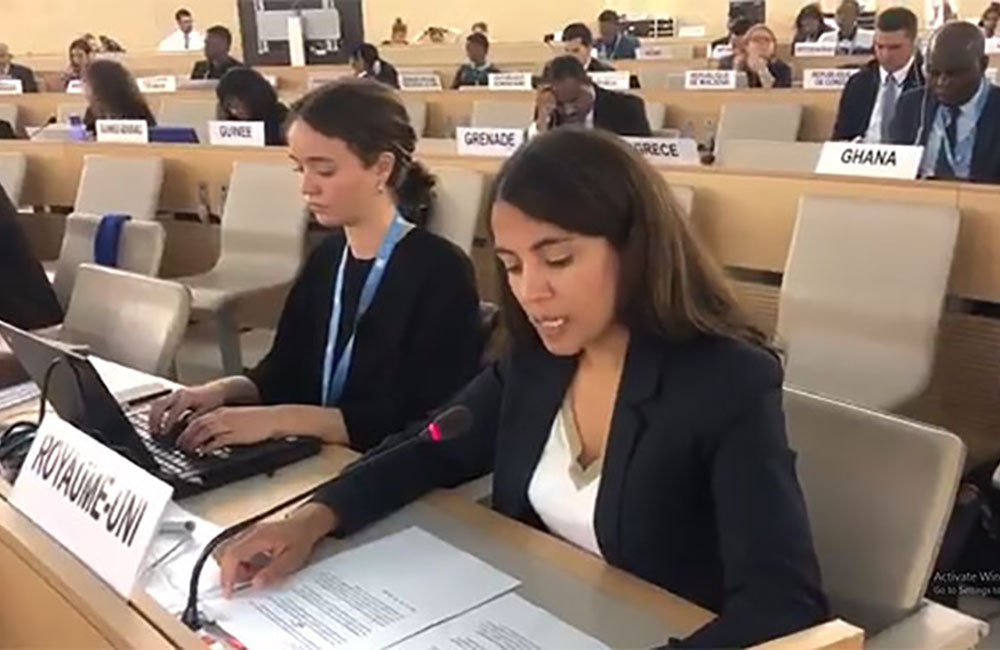
Core Group at UNHRC concerned over "roll back" of human rights
Addressing the United Nations Human Rights Council's (UNHRC) 44th Session, the UK's International Ambassador for Human Rights, Rita French, delivering a statement on behalf of the core group reiterated their "profound disappointment' over Sri Lanka's withdrawal of co-sponsorship from United Nations Human Rights Council (UNHRC) resolutions promoting accountability, reconciliation and human rights.
In February, the Sri Lankan government indicated that it no longer supported resolution 30/1, which Sri Lanka had co-sponsored in a landmark partnership with the international community to address the harmful legacies of war and build a sustainable peace in the country.
"We reiterate our profound disappointment at this development. We remain firmly committed to advancing the resolution’s goals of accountability, reconciliation, and inclusive peace in Sri Lanka," Ambassador French said.
The UNHRC observed that the Sri Lankan government has stated its own commitment to advancing these principles through domestic processes but stressed that any accountability mechanism must have the confidence of those affected.
"Since March, Sri Lanka has been battling COVID-19, and has kept case numbers significantly lower than the regional average. However, as stated by the High Commissioner, extraordinary measures to tackle the pandemic should not be used to roll back human rights. We share the concerns of Sri Lankan human rights organisations over the targeting and marginalisation of minority groups, the pardoning of Sergeant Sunil Ratnayake and promotion of others accused of serious violations during the conflict, and the militarisation of a wide range of civilian functions and public initiatives", the Core Group on Sri Lanka noted.
The UNHRC called on Sri Lanka to ensure that the country’s democratic space remains open and accountable and raised the detention of attorney-at-law Hejaaz Hisbullah who has been held without charges for nearly three months.
"We call for detentions and arrests to follow due process and be compliant with international norms and universal rights, for example in the case of lawyer Hejaaz Hizbullah, who has now been detained for almost three months without charge or presentation before the court. We call for an end to impunity for the violations and abuses of the past," Ambassador Rita French said.
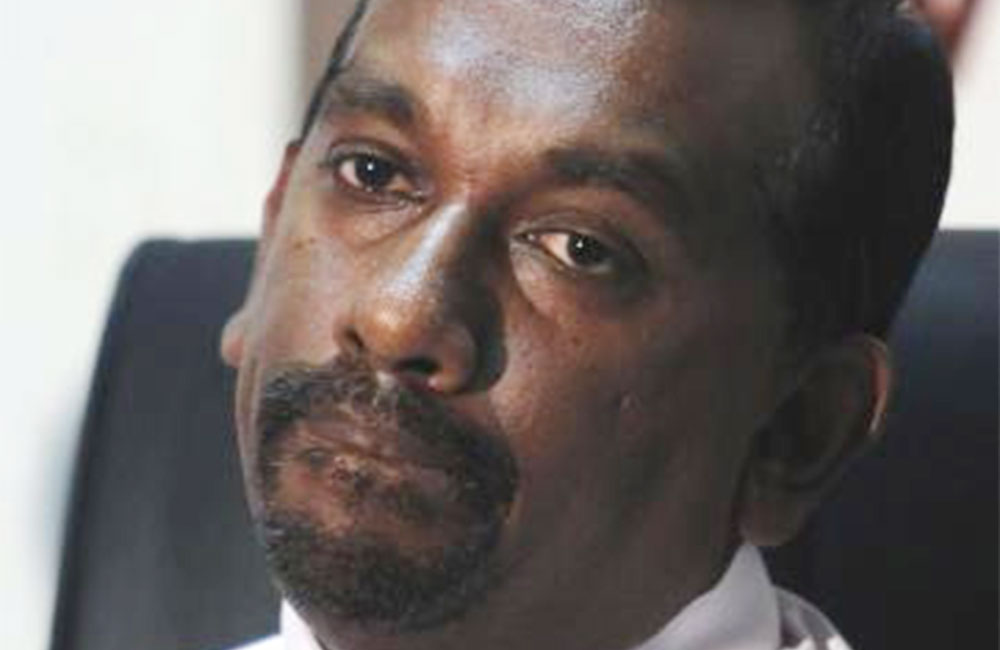
Complaint filed at Sports Ministry to investigate Mahindanada's bogus claims
The complaint has been lodged by the Socialist Youth Union (SYU) and the 'Save the Sport' organisation.
They pointed out that the former minister can be investigated under the new Act passed by the previous government on irregularities in sports including bribery as it applies to persons who level false allegations.
Accordingly, the complainants have requested to investigate the allegations leveled against by Aluthgamage as there was no evidence to corroborate the former minister's claims.

Special Police teams to probe PNB
“The four suspects were arrested during an ongoing special operation that was launched in collaboration with the CID and the PNB. The policemen were arrested for aiding a drug operation, and are now being questioned by the CID,” Police Media Spokesman SSP Jaliya Senaratne noted.
The police unit in question is said to have removed heroin weighing about 90 kg from a consignment of 250 kg that was peddled to Sri Lanka by a drug kingpin who is supposedly in hiding in Dubai.
The missing narcotics were allegedly sold to another competitor of the kingpin who is in hiding. The Inspector of Police (IP) heading that Police Narcotics Unit is said to have gone into hiding after the incident was reported.
A special operations unit is on the lookout for him; the unit has conducted search operations at his house and other areas he frequently visits.
A sub-inspector, two sergeants, and a constable are currently in custody, and further investigations are now being carried out by the CID and PNB with the assistance of the Minuwangoda Police Station.
Meanwhile, a total of 122 firearms have been seized by the Sri Lanka Police during crime-prevention raids carried out across the country within a period of three weeks.
Accordingly, 11 T-56 assault rifles, a T-81 rifle, 26 Twelve-bore shotguns, 3 pistols, 26 ‘Galkatas’ handguns, 46 repeaters rifles, and 9 other firearms have been seized in the raids. Also, 89 suspects have been arrested along with the weapons, the Police have said.
Further, 367 grams of explosives, 23 detonators, and 13 hand grenades have been apprehended with 10 suspects.
Page 275 of 539